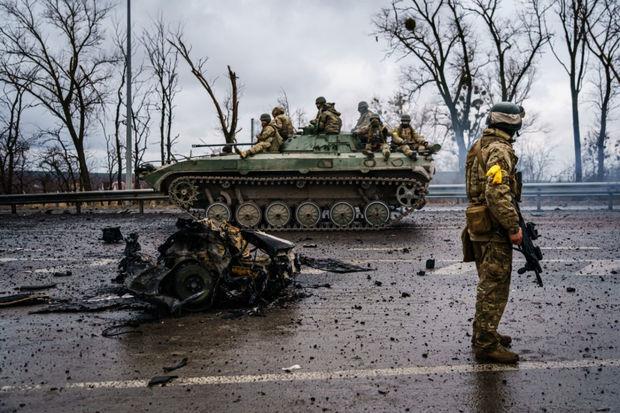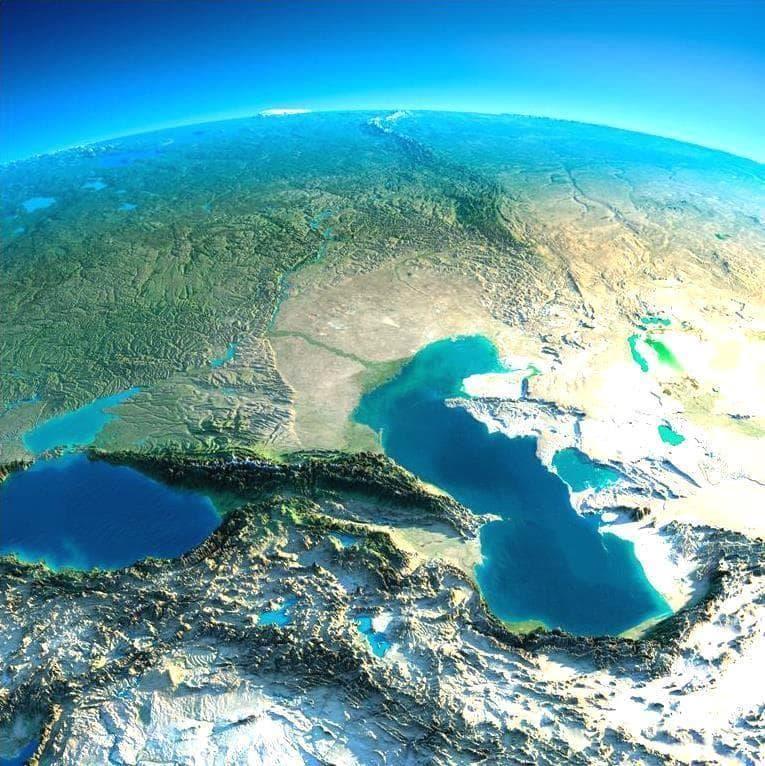"Weapons do not fit well into Caspian contours, there are other threats here" Zamir Karazhanov on Caliber.Az
Caliber.Az presents an interview with Kazakh political scientist and economist Zamir Karazhanov about the Caspian countries' geopolitics and the impact of the Ukraine war on the regional economic situation.
- How similar are the positions of the Caspian regional countries on Ukraine?
- Of course, the opinions of the Caspian five on the events in Ukraine differ in many ways. Most of the Caspian countries refuse to recognise the independence of the two regions of Ukraine and the sovereignty of the Russian Federation over Crimea. These are Kazakhstan, Azerbaijan, and Iran. President Ilham Aliyev expressed Azerbaijan's position, citing international law principles in his remarks. Not to mention the republic's own alienation of a portion of its territory, which was only returned through military means.
And Kazakhstan, as represented by the country's leadership, has stated repeatedly that it does not recognise the independence of Ukraine's two breakaway regions. The Republic categorically opposes separatism, viewing it as a destabilising factor. This thesis is also reflected in the SCO principles (of which the Russian Federation is a member), which declare the fight "against three types of evil": terrorism, extremism, and separatism. Iran also refused to recognise the Russian Federation's sovereignty over Crimea or the independence of two Ukrainian regions from Kyiv. However, Turkmenistan's position was restrained - neither "yes" nor "no." Officials refer to the country's neutral status. As for Russia, its position is known. However, despite the differences on this topic between the countries of the Caspian five, relations between them and the Russian Federation have not deteriorated.

- Do you think the Russian "special operation" has changed the geopolitical situation in the Caspian region? Has the Caspian Sea turned into a militaristic springboard, given the fact that Russian Calibers are launched in Ukraine from here?
- Indeed, there is such a problem. Russia has the largest flotilla in the Caspian Sea, armed with cruise missiles with a range of more than 2,000 km. This allowed her to attack targets in Syria, which is a completely different geographical area of the world. However, weapons, in my opinion, do not fit well into the Caspian contours, where, firstly, there are no military bases of third states, and secondly, there are other threats. Not to mention the fact that the Caspian Sea, during the adoption of the Convention on the Status of this reservoir in 2018, was called the "sea of friendship".
In this regard, it is worth noting that at the recent summit in Ashgabat, the heads of state signed a communique repeating the principles of the Caspian Convention. Meanwhile, Iran has not yet ratified this international document, which is why it cannot enter into force. However, the Ashgabat communique once again confirmed the commitment of the five countries to the principles of the Convention, that is, no State renounces them.
At the same time, one of the points of the communique declares "ensuring a stable balance of weapons of coastal states in the Caspian Sea, the implementation of military construction within reasonable sufficiency, taking into account the interests of all coastal states". And this is not just a principle of cooperation - over time it should be embodied in a treaty that will reflect the "balance of arms". Although ideally, the Caspian Five should strive to demilitarise the sea, and, in my opinion, it makes no sense to accumulate weapons in a region where there are no military threats. Moreover, the Caspian is a closed sea.
- So you are afraid of the militarization of the Caspian region?
- There are no grounds for the militarization of the region, much less an arms race. Indeed, there has been an increase in defence spending and military buildup in some countries. But the process was not related to the military-political situation in the Caspian region, the countries took such a step because of the threats emanating from other (non-Caspian) states. For Iran, this is US pressure, for Russia - the challenges of NATO expansion, Azerbaijan was concerned about the return of its territories. In Kazakhstan, the growth of defence spending is associated with the growth of the economy and the state budget. However, I repeat, there is no reason for the militarization of the Caspian Sea now. Firstly, there are no disagreements and contradictions between the countries on security issues - they do not see each other as potential adversaries. Secondly, the Caspian five is focused on cooperation and is currently strengthening cooperation and trusting relations.
- Some representatives of the expert community regard the war in Ukraine as a redistribution of the world order. What is the fate of Kazakhstan in this context?
- In my opinion, we are not talking about the redistribution of the world order, but about its crisis. It's not a cause, it's an effect. The world order is designed to maintain global stability and so it has come to an armed conflict in Europe, which means that the existing order is no longer able to guarantee peace and provide security to countries and peoples. According to Kazakh President Kassym-Jomart Tokayev, a former career diplomat, even in the conditions of the Cold War, the UN demonstrated more cohesion and unity than today. We are starting to live "in an era of change". According to Chinese belief, this is a difficult period, where risks grow, but at the same time new opportunities open up for states.
Most likely, Kazakhstan will stick to a multi-vector policy, maintaining relations with its key partners. In addition, the troubles in the "big world" will push the country to intensify cooperation with its neighbours in Central Asia, the Caspian Sea, and the Caucasus.

- Is there an expert opinion that the "urgent" holding of the 6th Caspian Summit was initiated by Russia because of its systemic political and diplomatic defeats at the global and regional levels in order to demonstrate "success anywhere"? Do you agree with this?
- I don't think Russia could use the summit in Ashgabat to satisfy its foreign policy ambitions. This is a regional platform where the global agenda is not formed. In addition, the 6th summit of the Caspian states was planned to be held in 2021 but then postponed. According to one version, because of the pandemic.
- Can the countries of the Caspian region replace the energy resources of the Russian Federation for Europe?
- The Caspian countries can increase energy exports, but they are unlikely to be able to replace the Russian Federation in the European market. Most likely, events will develop along the path of diversification of global energy supplies. Western sanctions have led to Russia increasing exports to China and India. Apparently, due to attractive prices for them. In the future, this may lead to the fact that the share of other energy exporters, primarily the Persian Gulf countries, will decrease in the markets of these two states. Those, in turn, will master the vacated niche of the Russian Federation in Europe. Largely due to the increased demand of the European Union, which is facing a shortage of energy. It turns out a global scheme of substitution of Russian gas and oil. However, this scheme has a drawback - the lack of developed infrastructure. Until recently, Russia has been actively building pipelines to Europe, not to Asia. In addition, it is unclear whether the infrastructure of EU ports is ready to accept large volumes of oil and gas. Such troubles can generate instability in the global energy market and fluctuations in oil and gas prices.
- Has Türkiye's role in the Caspian region, in particular in Central Asia, increased?
- It is only partially possible to assert the growing influence of Türkiye in the Caspian region. To be correct and precise, Türkiye has strengthened cooperation with certain Caspian countries, mainly Kazakhstan and Azerbaijan. At the same time, its relations with Iran remain cool so far.








